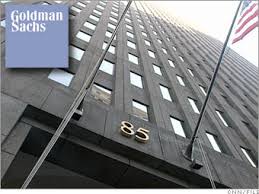 A former Goldman Sachs Group programer was indicted on charges he stole computer code for the investment bank's high-frequency trading platform, federal prosecutors said on Thursday.
A former Goldman Sachs Group programer was indicted on charges he stole computer code for the investment bank's high-frequency trading platform, federal prosecutors said on Thursday.
The former programer, Sergey Aleynikov, 40, was arrested and charged in July. The three-count indictment alleges that Aleynikov, who worked at Goldman from May 2007 to June 2009, illegally transferred and downloaded "hundreds of thousands of lines of source code for Goldman's high-frequency trading system" on his last day at the firm.
Ex-Goldman programmer indicted over HFT code theft
'Christian' Manifesto Comparing Liberals to Nazis Gathers Signatures of Religious Right Leaders -- and Catholic Bishops

The document, signed by such religious-right heavy-hitters as Focus on the Family eminence James Dobson and Prison Fellowship Ministries leader Chuck Colson, compares pro-choice advocates to eugenicists (and implicitly to Nazis) and equates same-sex marriage with polygamy and a gateway to legalized incest.
No joke: South Carolina now requires ’subversives’ to register
 Terrorists who want to overthrow the United States government must now register with South Carolina's Secretary of State and declare their intentions -- or face a $25,000 fine and up to 10 years in prison.
Terrorists who want to overthrow the United States government must now register with South Carolina's Secretary of State and declare their intentions -- or face a $25,000 fine and up to 10 years in prison.
Mich. Pastors File Suit Against Expanded Hate Crimes Law
 Four Christians filed a federal lawsuit challenging the recently enacted Hate Crimes Prevention Act, arguing that it seeks to criminalize deeply held religious beliefs that are in opposition to homosexuality.
Four Christians filed a federal lawsuit challenging the recently enacted Hate Crimes Prevention Act, arguing that it seeks to criminalize deeply held religious beliefs that are in opposition to homosexuality.
The new law, the lawsuit contends, "is an effort to eradicate religious beliefs opposing the homosexual agenda from the marketplace of ideas by demonizing, vilifying, and criminalizing such beliefs as a matter of federal law and policy."
TVNL Comment: What would Jesus say? Just asking....
The government has your baby's DNA
 Many parents don't realize their baby's DNA is being stored in a government lab, but sometimes when they find out, as the Browns did, they take action. Parents in Texas, and Minnesota have filed lawsuits, and these parents' concerns are sparking a new debate about whether it's appropriate for a baby's genetic blueprint to be in the government's possession.
Many parents don't realize their baby's DNA is being stored in a government lab, but sometimes when they find out, as the Browns did, they take action. Parents in Texas, and Minnesota have filed lawsuits, and these parents' concerns are sparking a new debate about whether it's appropriate for a baby's genetic blueprint to be in the government's possession.
US says it may kill Americans abroad
In a striking admission from the Obama Administration's top intelligence officer, Director of National Intelligence Dennis Blair announced Wednesday that the United States may target its own citizens abroad for death if it believes they are associated with terrorist groups.
America is broke, and needs its old friends
 The end of the American empire has long been foretold. But it's not hubris or hostile action that brings it low. It's a lack of readies, meaning unpaid, high-interest, foreign-owned debt, and an unaffordable lifestyle. And unlike the postwar period, when a Europe with common interests, a broadly similar political outlook, and shared values passed the security baton to the US, America has no like-minded, amicable successor to turn to as its own power fades. Quite the opposite, in fact.
The end of the American empire has long been foretold. But it's not hubris or hostile action that brings it low. It's a lack of readies, meaning unpaid, high-interest, foreign-owned debt, and an unaffordable lifestyle. And unlike the postwar period, when a Europe with common interests, a broadly similar political outlook, and shared values passed the security baton to the US, America has no like-minded, amicable successor to turn to as its own power fades. Quite the opposite, in fact.
More Articles...
Page 171 of 219

 Domestic Glance
Domestic Glance






























